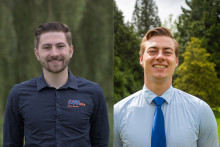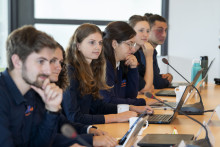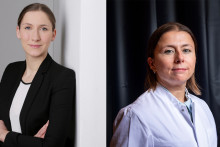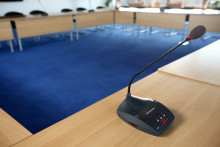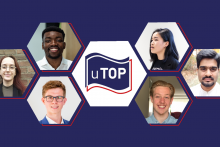The polls are about to open, but your party manifestos are not yet online. When is that going to happen?
Davies: 'The programme will be published online this week. In general, it is the same programme as last year, but we supplemented the major current themes, such as the UT's finances. Last year, there were fewer acute challenges.'
Kamphuis: 'The programme is finished, so it can be published online at any time. With just a few days to go, it's time for that.'
The nine student seats have been divided in the same way for the past three years: UReka six, DAS three. What does that say about the state of participation?
Davies: 'It is striking that no new parties throw their hat in the ring. It may be the case that students accept the status quo and feel sufficiently represented in the current set-up. We're trying to go big with next week's elections. We visit students and try to make them aware of the importance of the elections. The biggest gains can be made in the group that does not vote, about three-quarters of the students. Reaching that group is the hardest part.'
Kamphuis: 'That the involvement of UT people is too low. We are doing our very best, but it would be great if a new candidate or a new party came forward that could more easily reach its own constituency. With DAS, we will visit students every evening next week, at associations, in houses and during the day we will hand out flyers on campus. I think both UReka and we are perfectly capable of reaching students, but there is a whole sea of students who are not as engaged and often do not vote. We try to reach and involve those people.'
What election outcome are you hoping for?
Davies: 'In any case, a higher turnout, that would be good for everyone. The more seats we get with UReka, the better. We want to be proactive, and the best way to do that is with a large number of seats. Who knows, maybe we'll win a seventh seat, but I don't expect that. In any case, we want to keep six.'
Kamphuis: 'Last year we were very close to the fourth seat. A small number of votes gave the remaining seat to UReka. In any case, we are hoping for that fourth seat this year, but the more the merrier, of course.'
(Text continues below the photo.)

Student activism is under pressure and with the return of the long-studying fine, that pressure only seems to increase. How do you hope to do something about that?
Davies: 'That's very difficult. The proposal is still in its early stages, but we want to emphasize that activism is what makes this campus and university so beautiful. We have been wanting to boost activism for some time and such a proposal is causing concern among many students. The Executive Board often talks about the importance of activism, and that is positive, but that must now also be reflected in action. The importance of activism is enormous for the university.'
Kamphuis: 'As a party, we hope to rise above the council on this theme. We are working with the Student Union on an opinion piece in national newspapers and are also in discussion with the Dutch National Student Association (ISO) about what we can do about this. The long-studying fine is the death knell for activism, if it returns, student life as we know it will cease to exist. We cannot accept that. If necessary, we as students should mobilise in The Hague.'
What is the most important theme for you in the coming academic year?
Davies: 'The quality of education is our top priority. The same goes for the opinion of the students. Whatever the university wants, the student's opinion must always be taken into account. The UT's finances and the issue of internationalisation are major themes and can affect the quality of education, we will be very keen on that. Quality must be guaranteed.'
Kamphuis: 'In addition to the concerns about student activism, there is also the financial situation of the UT and the consequences of the Internationalisation in Balance Act. On these issues, we want to ensure that our voters are disadvantaged as little as possible by the consequences of these two dossiers.'
Why should students vote for UReka/DAS?
Davies: 'We are proud to be a party for all students, not just for our own constituency. We are proactive and for positive change. Every cycle, we listen to students' concerns and present them to the Executive Board. We will continue to do so, preferably for as many students as possible.'
Kamphuis: 'As elected representatives, we represent the student by definition, but with DAS we continue to emphasise that studying is so much more than just the study you follow. Studying is not only about good education and the beautiful campus, but also about the opportunity to develop yourself outside of your studies. We will continue to fight for that.'


